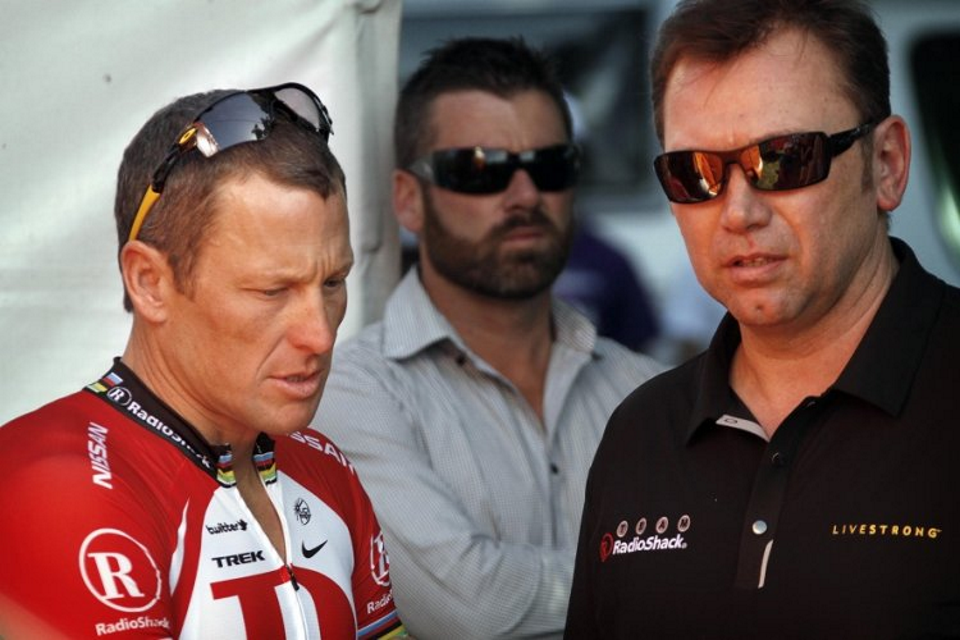Johan Bruyneel ordered to payback $1.2M in Lance Armstrong fraud case
A federal judge ordered Lance Armstrong’s former cycling team manager Johan Bruyneel to pay back $1.2 million to the federal government for his part in Armstrong’s doping fraud
The government had accused the former manager, Johan Bruyneel, of unjust enrichment at the expense of the U.S. Postal Service, which paid $32.3 million to sponsor Armstrong’s cycling team from 2000 to 2004.
The judge also put Bruyneel on the hook for an additional $369,000 in civil penalties, even though he still might try to avoid recognizing these American court rulings as a foreign citizen living overseas.
“This ruling marks the finish line of a lawsuit brought by Floyd Landis and the federal government to recover money paid by the U.S. Postal Service to sponsor a professional cycling team featuring Lance Armstrong,” U.S. District Judge Christopher Cooper wrote.

The rulings are part of a civil fraud lawsuit that started in 2010, when Landis –Armstrong's former teammate – filed a complaint against Armstrong and Bruyneel as a government whistleblower. The government joined Landis' suit in 2013 and said the Postal Service never would have paid for the sponsorship if it known the team was using banned drugs and blood transfusions to cheat in races.
The government sought that money back in triple under the False Claims Act – nearly $100 million – but ultimately reached a settlement with Armstrong, who agreed to pay nearly $7 million to end the case in April.
The civil default judgments against Bruyneel were ordered Wednesday after he failed to put up a defense in the case since 2014, unlike Armstrong, who fought this case for years as an American citizen.
Such judgments could affect any assets Bruyneel has in the U.S, but it’s not clear the government will ever collect the money from him as a Belgian living in Europe.
An expert in transnational law told USA TODAY Sports in May that it is unlikely that a "default judgment like this would be enforced overseas.”
Such judgments still represent "potential risk somewhere," said the expert, Linda Silberman, a law professor at New York University. For example, she said there's always a possibility that "assets might come into the United States, where enforcement is likely to be required."
Bruyneel appeared to take this gamble four years ago, when he quit responding to the case and instructed his attorneys to withdraw as his representatives.
Bruyneel didn’t immediately return a message seeking comment. He had been at Armstrong's side during all seven of his tarnished victories in the Tour de France and recently has lived in London and Madrid.
In this case, the government said he “directed and facilitated” the illicit doping scheme with the U.S. Postal Service team.
The judge noted that Bruyneel’s bank records indicate that he was paid $2,047,833 in salary and bonuses during the period of time USPS sponsored the cycling team. USPS financed 60% of Tailwind’s expenses, which would include 60% of the salary and bonuses paid to Bruyneel.
“Here, the government has substantiated that Bruyneel unjustly received $1,228,700 in benefits,” the judge wrote. “The Court will thus enter judgment for the government against Bruyneel on its unjust enrichment claim and award it $1,228,700 in restitution.”
The judge also imposed $369,000 in penalties against Bruyneel and Tailwind Sports, the defunct company that managed Armstrong’s cycling team. Tailwind submitted 41 claims for payment from the Postal Service during the relevant time and could have been penalized $5,500 to $11,000 in penalties per claim under the False Claims Act.
“The Court by no means sanctions the defaulting defendants’ conduct,” the judge wrote. “But the circumstances here do not rise to the degree warranting the maximum level of civil penalties. The Court will instead award an amount closer to the middle of the range. It will impose a civil penalty of $9,000 per false claim submitted, for a total penalty of $369,000.”
Because Tailwind dissolved in 2007 and Bruyneel lives overseas, the rulings against him might only be symbolic in the end.
Armstrong confessed to doping in January 2013 after more than a decade of false denials about it. The government joined Landis’ lawsuit later that year and was headed to trial against Armstrong in May before he agreed to pay $6.65 million to end the case, including $2.75 million owed to Landis and his attorneys for their roles as government whistleblowers. The remaining $3.9 million was owed to the government, according to the settlement.
The settlement left Bruyneel and Tailwind as the remaining loose ends in the case. In a separate motion, Landis argued that Bruyneel should be on the hook for much more, but the judge denied that request. Landis, who also is a confessed doper, still could be in line to recover an undetermined amount of additional money from these judgments.
Landis’ attorney, Paul Scott, said they are “very pleased with the precedent set by this case, which resulted in a doping athlete being held responsible to a sponsor for millions of dollars.”
“That result sends a simple and clear message to others contemplating the same conduct,” Scott said. “Doping and cheating may get you ahead of the pack temporarily, but sooner or later justice will catch up."









